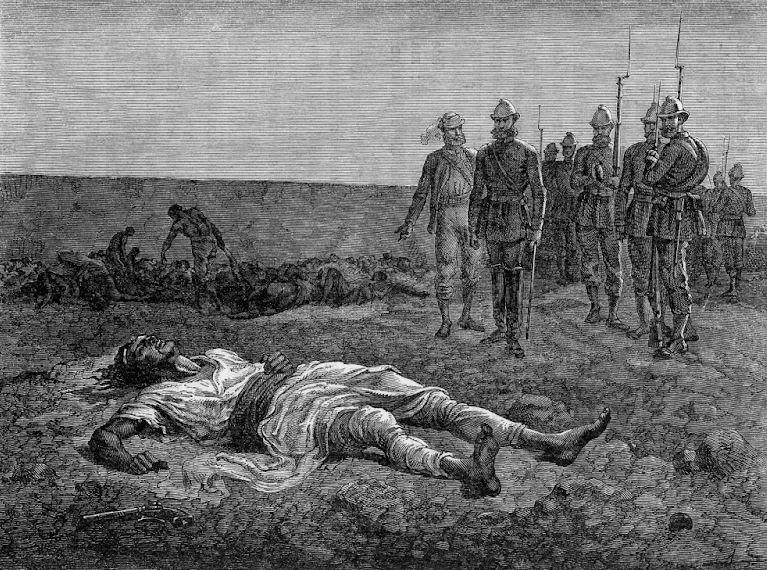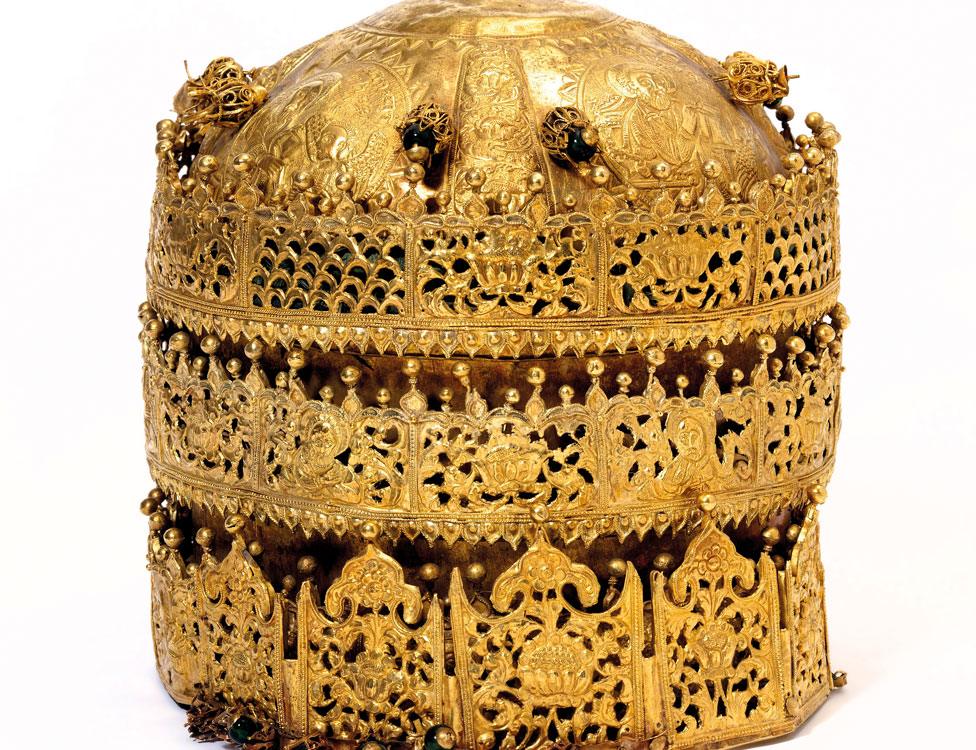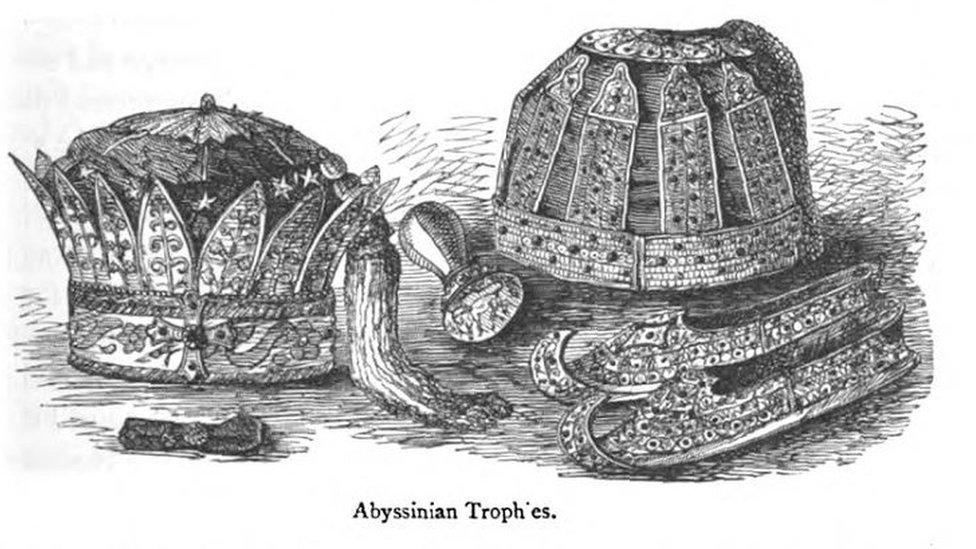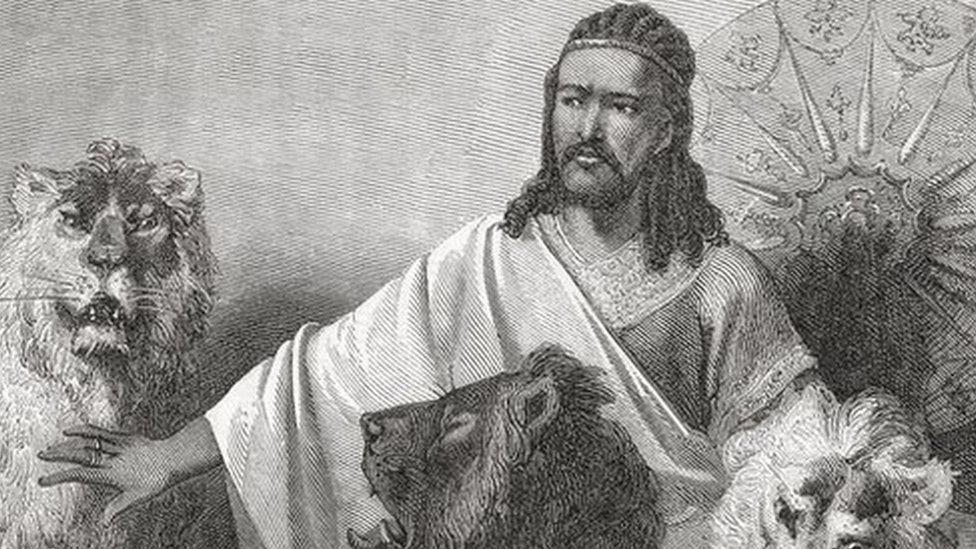Could Ethiopian emperor’s stolen clothes be found in Manchester?
- Published

A 19th century engraving of the body of Ethiopia's Emperor Tewodros II
A historian is trying to solve the puzzle of what happened to an African emperor's garments that were stolen 156 years ago - and believes they may have found their way to Manchester.
Emperor Tewodros II had his prized coat and scarf ripped from his body during a British invasion of Ethiopia in 1868.
Andrew Heavens is urging people to check their attics as he believes parts of the items may be lost in the city.
He said finding any relic of the emperor would be "a huge deal".
Ethiopia is appealing for the return of any artefacts taken during the battle "in the same way Greece wants the Elgin Marbles back", Mr Heavens said.
Britain's invasion saw soldiers charging into the east African mountain kingdom of Abyssinia - now known as Ethiopia - in a bid to free European captives.
Defeating the emperor, who took his own life amid the destruction, the British then fled, taking with them various treasures including gold crowns, illuminated manuscripts and sacred carvings.
They also ripped up the emperor's scarf and coat, and cut off locks of his hair for souvenirs.

This golden crown was also taken during the battle
Mr Heavens, who has written a book on the subject, The Prince and the Plunder, said "bits and pieces" from the battle have been turning up ever since, with the National Army Museum returning a lock of the emperor's hair to Ethiopia in 2019.
A small piece of his silk scarf was also presented to Stamford Park Museum in Stalybridge - just outside Manchester.
Mr Heavens now believes part of the scarf or coat may have been taken to somebody's home after the museum was demolished in the 1950s.
Bits of the collection survived and were distributed to other local museums - but Mr Heavens' efforts to find evidence of the clothes have so far turned up a blank.
"[The scarf] may have been lost or destroyed," he said.
"But I thought there was just a chance someone took it home when the museum closed, particularly if it was in a nice display case."
However, Stalybridge Library and Tameside Metropolitan Borough Museum said they do not have the clothes in their collection.
The historian has since sent requests to Tameside Local Studies and Archives Centre and Manchester Museum.
According to the National Army Museum, external, Emperor Tewodros had established his rule since 1855 through war but also continued to face many internal rebellions as he tried to remain in power.

Crowns and other trinkets have also been pictured in old engravings
In 1862 he asked the British government for an alliance and assistance in acquiring the latest weapons and tactical experts to help him - but his request went unanswered.
As a result he seized a number of European hostages, among them was the British Consul, Captain Charles Cameron, who was kept in chains for over two years.
It created a public outcry that forced the government into a response - resulting in the invasion and subsequent looting.
Historians say 15 elephants and 200 mules were needed to cart away all the stolen treasure from Maqdala, external, the emperor's northern citadel capital.
Ethiopia lodged a formal request in 2008 at various British institutions for the return of the items.

Why not follow BBC Manchester on Facebook, external, X, external and Instagram, external? You can also send story ideas to northwest.newsonline@bbc.co.uk, external
Related topics
- Published4 March 2019
